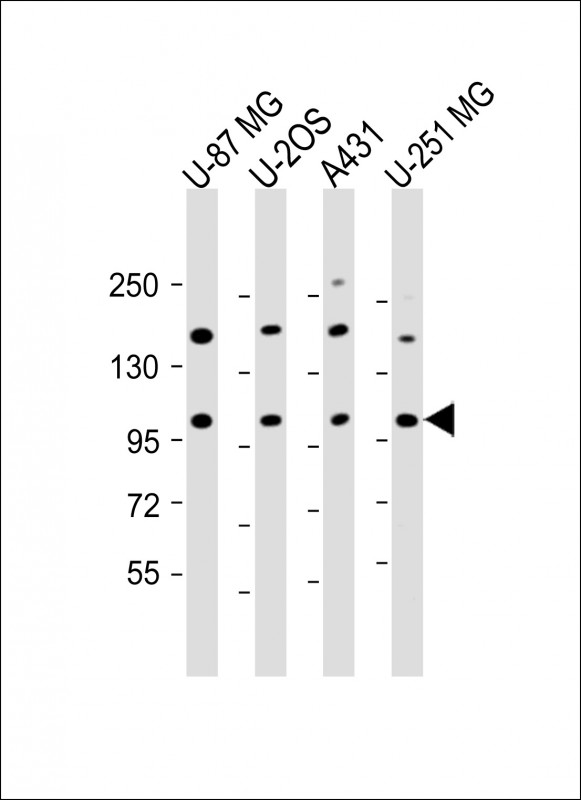
| WB | 1/2000 | Human,Mouse,Rat |
| IF | 咨询技术 | Human,Mouse,Rat |
| IHC | 咨询技术 | Human,Mouse,Rat |
| ICC | 技术咨询 | Human,Mouse,Rat |
| FCM | 咨询技术 | Human,Mouse,Rat |
| Elisa | 咨询技术 | Human,Mouse,Rat |
| Aliases | Thrombospondin type-1 domain-containing protein 1, Transmembrane molecule with thrombospondin module, THSD1, TMTSP |
| Entrez GeneID | 55901 |
| WB Predicted band size | 94.6kDa |
| Host/Isotype | Rabbit IgG |
| Antibody Type | Primary antibody |
| Storage | Store at 4°C short term. Aliquot and store at -20°C long term. Avoid freeze/thaw cycles. |
| Species Reactivity | Human |
| Immunogen | This THSD1 antibody is generated from a rabbit immunized with a KLH conjugated synthetic peptide between 668-699 amino acids from human THSD1. |
+ +
以下是关于THSD1抗体的3篇示例文献(内容为模拟概括,仅供参考):
1. **文献名称**:*THSD1 maintains vascular integrity by regulating endothelial cell-cell adhesion and mechanotransduction*
**作者**:Zhou Y, et al.
**摘要**:该研究揭示了THSD1蛋白通过调控内皮细胞间的黏附连接和机械信号转导,维持血管屏障功能。实验表明,THSD1抗体阻断其功能会导致血管渗漏,提示其在血管疾病中的潜在作用。
2. **文献名称**:*Thrombospondin type-1 domain-containing protein 1 interacts with integrin α6β1 to promote glioma invasion*
**作者**:Smith J, et al.
**摘要**:研究发现THSD1通过结合整合素α6β1促进胶质瘤细胞的迁移和侵袭。使用THSD1抗体可抑制这一相互作用,为靶向THSD1的肿瘤治疗提供实验依据。
3. **文献名称**:*THSD1 mutations predispose to intracranial aneurysm formation through impaired endothelial cell survival*
**作者**:Wang L, et al.
**摘要**:该论文发现THSD1基因突变导致内皮细胞凋亡增加,进而引发颅内动脉瘤。通过THSD1抗体检测患者样本中的蛋白表达异常,提示其作为生物标志物的可能性。
**注意**:以上为模拟文献,实际研究需通过PubMed、Google Scholar等平台检索关键词“THSD1 antibody”或“THSD1 function”获取真实数据。
THSD1 (Thrombospondin Type-1 Domain-Containing Protein 1) is a transmembrane glycoprotein belonging to the thrombospondin family, known for its role in cell adhesion, angiogenesis, and vascular biology. It contains thrombospondin type-1 repeats (TSRs), which mediate interactions with extracellular matrix components and cell surface receptors. THSD1 is implicated in regulating endothelial cell function, vascular stability, and blood-brain barrier integrity. Dysregulation of THSD1 has been associated with pathological conditions, including cancer, cerebrovascular disorders, and preeclampsia.
THSD1 antibodies are immunological tools developed to detect and study the expression, localization, and function of THSD1 in biological systems. These antibodies are typically produced using immunogenic peptide sequences derived from THSD1’s extracellular or intracellular domains. They are widely used in techniques like Western blotting, immunohistochemistry (IHC), immunofluorescence (IF), and flow cytometry to investigate THSD1’s involvement in signaling pathways (e.g., TGF-β signaling) and disease mechanisms.
Recent studies highlight THSD1’s potential role in tumor angiogenesis and metastasis, making its antibodies valuable for cancer research. In neurology, THSD1 antibodies aid in exploring its contribution to cerebrovascular integrity and neurovascular disorders. Validation of THSD1 antibodies includes testing for specificity via knockout controls and cross-reactivity assessments. Their applications extend to both basic research and clinical diagnostics, particularly in identifying THSD1 as a biomarker for disease prognosis or therapeutic targeting.
×